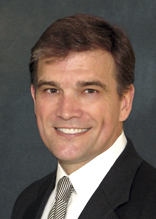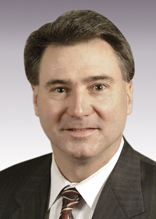By Janet Elliott
Staff Writer for The Texas Lawbook
Texas Republican leaders delayed planning for health care reform, choosing instead to put all their bets on the law being found unconstitutional. Now that it has been upheld in a 5-4 decision, they have to consider how to implement the law.
“One thing that’s clear, the state of Texas has now got to get over their immediate negative reaction, roll up their sleeves and get to work because they’ve got some work to do,” said Wilson Jones, a partner in the Dallas office of Thompson & Knight who represents corporate health clients.

For hospitals, health insurers and physicians who have been quietly implementing portions of the Affordable Care Act for the past two years, the ruling means they don’t have to reset their efforts. There was a clear sense of relief that the court didn’t do what many observers had predicted: throw out the individual mandate while keeping other requirements intact.
Instead, the court determined that the requirement that individuals purchase health insurance was within Congress’ taxing authority.
Mac Stewart, a partner in Stewart Dugger & Dean, a Dallas health care law firm, said he spent the day on the phone with clients.

“I’m telling them the Supreme Court did what they always do, decide cases on the narrowest possible grounds,” he said.
Other lawyers were making the following observations with their clients:
• hospitals will see increased revenue from more patients who are insured;
• insurance companies will have to justify future rate increases;
• more partnerships are likely between physician groups and hospitals to implement provisions requiring better coordination of care; and
• employers must decide whether to continue to provide group coverage or help workers buy their own coverage on the market.
Texas Attorney General Greg Abbott, who was instrumental in shaping the challenges of Texas and 25 other states to the law, was at the Supreme Court for the historic announcement.
Like many watching, he initially was pleased when Chief Justice John Roberts endorsed his core argument that the law exceeds Congress’ authority under the commerce clause.
“But yet, because of a novel application of the tax and spend authority — an application that I don’t recall anyone bringing up at anytime during the course of this case — it turned out that Obamacare was upheld,” said Abbott during a conference call with reporters.
He said that Roberts, who provided the decisive swing vote, “may have seemingly engaged in some judicial activism” by “quite literally reaching to uphold validity of the law.”
Despite the bulk of the law being upheld, Texas won a key argument when the court struck down a requirement that states participate in the Medicaid expansion or lose all their federal matching funds.
Mixed Bag for Hospitals, Doctors
Hospitals got behind the 2010 Patient Protection and Affordable Care Act because it promised that more of the patients they serve would be insured. Even though they will see cuts in reimbursement for Medicare patients, Jones said they should experienced increased revenue from insured patients.
The outcome isn’t as certain for physicians who serve patients on Medicare and Medicaid.
“For hospitals, more insured people are coming through the doors,” said Jones. “Doctors, yes, are getting more insured patients but the compensation for seeing them is fairly low and now tied to quality metrics.”
The ruling is especially good news for one of Thompson & Knight’s clients, North Texas Specialty Physicians. The association of more than 600 family and specialty doctors has partnered with Texas Health Resources, one of the largest faith-based health systems in the U.S., to implement a key feature of the law known as Accountable Care Organizations, or ACO.
The federal government selected the entities as one of 32 pioneer models to improve patient health while reducing the rate of growth in Medicare. If care is improved by reducing hospital readmissions, for example, the doctors and hospitals will enjoy financial benefits, Jones said.
Insurance companies will have more healthy people paying into the pool to offset some of the costs of covering more people, including those with pre-existing conditions. The federal government now has rate review authority over insurance rate increases under the law.
Businesses were waiting for the outcome before getting down to serious discussions about the future of their health plans, lawyers say.
“The bigger issues are planned design and how employers want to deal with their health plans going forward,” said Scott Austin, a partner at the Dallas firm of Hunton & Williams who advises companies about employee benefits. “Will they continue to offer group health coverage or allow employees to go to exchanges and get their own coverage, perhaps with some sort of subsidy?”

These are important decisions involving finances and employee relations. Austin said some employers are putting together corporate exchanges to provide coverage.
More immediately, businesses will have to comply with benefits disclosure requirements effective with this year’s open enrollment periods. And on next year’s W2 tax forms employers must report the value of health benefits provided to workers.
Abbott’s Legal Strategy Debated
As the legal case simmered, Gov. Rick Perry and the Legislature last year declined to pass a bill setting up a state exchange — an online marketplace for Texans to review and purchase health plans. Abbott said it remains unclear whether an exchange is necessary.
“How all this is going to work, we simply don’t know yet, but we will have to operate swiftly to come up with some conclusions pretty quickly,” Abbott said.
Jonathan Henderson, a partner at Polsinelli Shughart in Dallas, says the law requires state governments to establish exchanges next year.
“Texas officials need to find a way to get it done quickly or the federal government will create an exchange for them,” says Henderson. “The bottom line for most providers is that this decision is anti-climactic and means business as usual.”
Texas elected officials also now must decide whether to expand Medicaid. Even though initial costs of the expansion will be covered by the federal government, state officials already are worried that Medicaid costs are growing too rapidly.
With Abbott taking such a high profile role in crafting the legal strategies for the states’ challenge, some lawyers were wondering if he overplayed the commerce clause argument.
Chris Johns, an appellate partner in the Austin office of Johns Marrs Ellis & Hodge, said most people thought the case would rise or fall on the commerce clause and were not focused on the tax issue.
He said the Obama administration “didn’t want to call it a tax but wrote it in such a way that allowed the court to say, yeah, looks like a tax.”
Johns said Abbott is justified in claiming victory for overturning the requirement that states expand their Medicaid rolls or lose all of their federal matching funds.
“This is the first time that putting conditions on federal funding has been found unconstitutional for being coercive,” Johns said. “As a practical matter, that’s a serious limitation on Congress’ power.”
Stewart said Abbott can actually be pretty proud of getting the court to agree with the commerce clause argument.
“I think Abbott acquitted himself well taking positions that were accepted by some of the best scholars in the country,” he said.
Will Law Improve Affordability?
On the morning of the ruling, Dallas lawyer Jane Taber was negotiating the purchase of a physician practice group by a hospital. She expects more such consolidations as doctors and hospitals try to lower costs and achieve economies of scale by bundling reimbursement for medical procedures involving patients on Medicare and Medicaid.
“We’re seeing — and we have ever since the bill passed — a consolidation of hospital and physician practices throughout Texas,” said Taber, a member of Taber Estes Thorne & Carr.
A major test for the Affordable Care Act, which won’t be fully implemented until 2014, is whether it slows the growth of health care costs so they are more in line with other cost-of-living expenses.
“This hasn’t resolved our health care problems by any means,” Taber said.
PLEASE NOTE: Content of The Texas Lawbook is controlled and protected by specific licensing agreements with our subscribers and under federal copyright laws. Any distribution of this content without the consent of The Texas Lawbook is prohibited.
